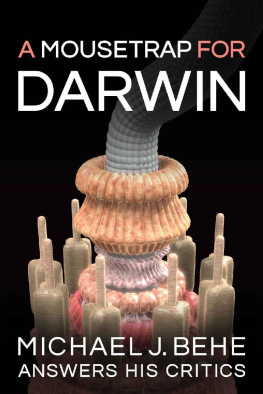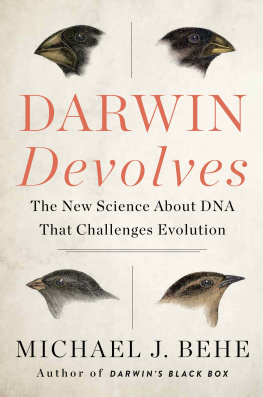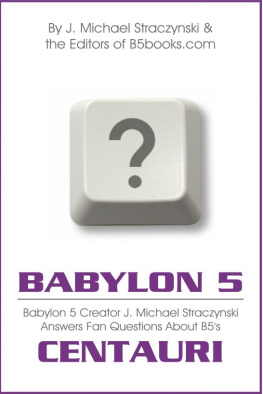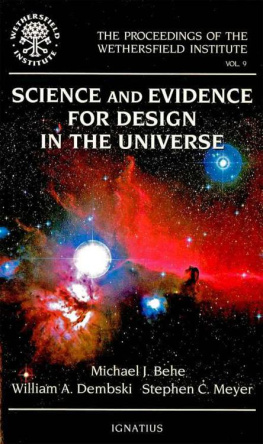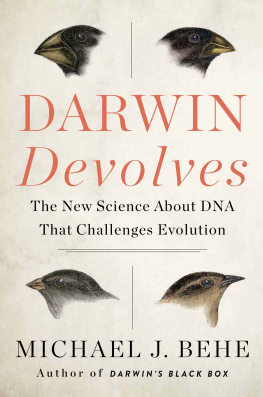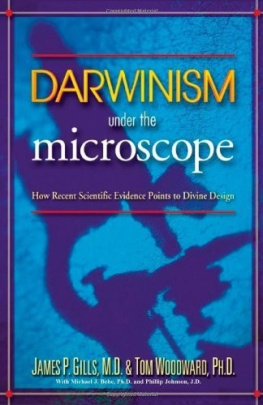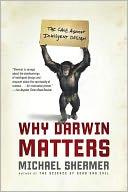Michael J. Behe - A Mousetrap for Darwin: Michael J. Behe Answers His Critics
Here you can read online Michael J. Behe - A Mousetrap for Darwin: Michael J. Behe Answers His Critics full text of the book (entire story) in english for free. Download pdf and epub, get meaning, cover and reviews about this ebook. year: 2020, publisher: Discovery Institute, genre: Romance novel. Description of the work, (preface) as well as reviews are available. Best literature library LitArk.com created for fans of good reading and offers a wide selection of genres:
Romance novel
Science fiction
Adventure
Detective
Science
History
Home and family
Prose
Art
Politics
Computer
Non-fiction
Religion
Business
Children
Humor
Choose a favorite category and find really read worthwhile books. Enjoy immersion in the world of imagination, feel the emotions of the characters or learn something new for yourself, make an fascinating discovery.
- Book:A Mousetrap for Darwin: Michael J. Behe Answers His Critics
- Author:
- Publisher:Discovery Institute
- Genre:
- Year:2020
- Rating:4 / 5
- Favourites:Add to favourites
- Your mark:
- 80
- 1
- 2
- 3
- 4
- 5
A Mousetrap for Darwin: Michael J. Behe Answers His Critics: summary, description and annotation
We offer to read an annotation, description, summary or preface (depends on what the author of the book "A Mousetrap for Darwin: Michael J. Behe Answers His Critics" wrote himself). If you haven't found the necessary information about the book — write in the comments, we will try to find it.
Michael J. Behe: author's other books
Who wrote A Mousetrap for Darwin: Michael J. Behe Answers His Critics? Find out the surname, the name of the author of the book and a list of all author's works by series.
A Mousetrap for Darwin: Michael J. Behe Answers His Critics — read online for free the complete book (whole text) full work
Below is the text of the book, divided by pages. System saving the place of the last page read, allows you to conveniently read the book "A Mousetrap for Darwin: Michael J. Behe Answers His Critics" online for free, without having to search again every time where you left off. Put a bookmark, and you can go to the page where you finished reading at any time.
Font size:
Interval:
Bookmark:
A MOUSETRAP FOR DARWIN
The Bacterial Flagellum Motor |
A MOUSETRAP
FOR DARWIN
MICHAEL J. BEHE
SEATTLE DISCOVERY INSTITUTE PRESS 2020
Description
In 1996 Darwins Black Box thrust Lehigh University biochemist Michael Behe into the national spotlight. The book, and his subsequent two, sparked a firestorm of criticism, and his responses appeared in everything from the New York Times to science blogs and the journal Science . His replies, along with a handful of brand-new essays, are now collected in A Mousetrap for Darwin . In engaging his critics, Behe extends his argument that much recent evidence, from the study of evolving microbes to mutations in dogs and polar bears, shows that blind evolution cannot build the complex machinery essential to life. Rather, evolution works principally by breaking things for short-term benefit. It cant construct anything fundamentally new. What can? Behes money is on intelligent design.
Copyright Notice
Copyright 2020 by Discovery Institute, All Rights Reserved.
Library Cataloging Data
A Mousetrap for Darwin by Michael J. Behe
556 pages, 6 x 9 x 1.1 inches & 1.6 lb, 229 x 152 x 29 mm. & 0.74 kg
Library of Congress Control Number: 2020948398
ISBN-13: 978-1-936599-90-5 (hardback); 978-1-936599-91-2 (paperback); 978-1-936599-92-9 (EPUB); 978-1-936599-93-6 (Kindle)
BISAC: SCI027000 SCIENCE / Life Sciences / Evolution
BISAC: SCI049000 SCIENCE / Life Sciences / Molecular Biology
BISAC: SCI007000 SCIENCE / Life Sciences / Biochemistry
Publisher Information
Discovery Institute Press, 208 Columbia Street, Seattle, WA 98104
Internet: http://www.discoveryinstitutepress.com/
Published in the United States of America on acid-free paper.
First Edition, November 2020.
P RAISE FOR A M OUSETRAP
FOR D ARWIN
Wow, what a book! Michael Behes A Mousetrap for Darwin is a compelling read for anyone following the Darwin vs. ID debate. It not only is a magnificent testimony to his own massive contributions in so many areas of ID over more than two decades since he first published Darwins Black Box, but also provides perhaps the most comprehensive and incisive critique of Neo-Darwinism currently in print. In the more than one hundred articles and posts in the book, Behe revisits key arguments for ID which he initially developed and that have since become foundational to the defense of ID, such as the argument from irreducible complexity and the argument from waiting times. The book represents a devastatingly brilliant unanswerable response to his Darwinian critics and to the whole Darwinian worldview. Behe brings out more forcibly than any other author I have recently read just how vacuous and biased are the criticisms of his work and of the ID position in general by so many mainstream academic defenders of Darwinism. And what is so telling about his many wonderfully crafted responses to his Darwinian critics is that it is Behe who is putting the facts before theory while his many detractorsKenneth Miller, Jerry Coyne, Larry Moran, Richard Lenski, and othersare putting theory before the facts. In short, this volume shows that it is Behe rather than his detractors who is carefully following the evidence. Of all the fine essays in this volume, I think his responses to Lenski in Parts 4 and 7 are particularly outstanding and unanswerable. Lenskis inability to undermine Behes critique gives the lie to the notion that Darwinism provides anything resembling a convincing account of the biological world.
Michael Denton, PhD, MD, former Senior Research Fellow in the Biochemistry Department at the University of Otago in Dunedin, New Zealand, author of Evolution: A Theory in Crisis and Natures Destiny
Ever since the release of Darwins Black Box in 1996, I have been impressed with Mike Behes ability to respond to his critics quickly, respectfully, and with clarity and patience. This collection of many of those responses over a twenty-four-year period is a gift to all who promote intelligent design, and indeed to anyone passionately interested in the science of biological origins and the contemporary debate over Darwinism and design. Both critics and champions of intelligent design will find much to ponder here. Behe repeatedly meets his critics head on and with no apologies. This collection is a treasure.
Raymond G. Bohlin, PhD, co-author of T he Natural Limits to Biological Change
Michael Behes Darwins Black Box , T he Edge of Evolution , and Darwin Devolves clearly describe the problems and limits of Darwinism as well as what the mechanism of random mutation and natural selection actually does. Over the years Behe has received a mountain of criticism, all of which has been answered in detail by him in letters to the editors of various journals, newspapers, and blogs. Now, in A Mousetrap for Darwin , Behe treats his readers to his compelling and thorough responses to his critics. Anyone reading this book will become better informed of the powerful arguments for design in biology and better educated regarding the Design vs. Darwin debate. I greatly enjoyed Mousetrap and highly recommend it.
Russell W. Carlson, PhD, Emeritus Professor of Biochemistry & Molecular Biology and the Complex Carbohydrate Research Center University of Georgia
The humorous Mosquito Bite Scratcher illustration in Michael Behes 1996 book Darwins Black Box opened my eyes to the irreducibility of biological systems. Ever since, I have followed Behes tireless defense of his position in numerous well-argued articles and responses. His style is respectful; he carefully studies the arguments of his critics and explains why they err. His mousetrap example, the bacterial flagellum motor and other irreducibly complex biological systems, the mounting laboratory evidence of the strict limits of evolution, and his devolution argument should drive the message home: the idea that lifes diversity emerged through the Darwinian evolutionary mechanism is a dead idea. This book is a welcome and valuable collection of these brilliantly argued articles.
Matti Leisola, DSc, Professor Emeritus of Bioprocess Engineering, Aalto University, Finland
Over the years I have followed Michael Behes work in building an arsenal of arguments for intelligent design. And I have followed the desperate attempts of mainstream evolutionists to discredit that work. Ive found that in their attacks, they have used fallacious logic and zombie science at every turn. A few of the critiques are superficially persuasive, but they hold up best if you dont think too hard about the biochemical details of their evolutionary scenarios. If you fear to doubt Darwinism, read further at your own peril. Behes devastating rebuttals are here in spades. If, however, you are ready and willing to follow the evidence, take heart: Behe guides us into state-of-the-art biochemistryand into the case for intelligent designwith elegance, clarity, and good grace. This collection is a delight.
Marcos Eberlin, PhD, member of the Brazilian Academy of Sciences and winner of the prestigious Thomas Medal (2016)
C ONTENTS
I NTRODUCTION
S INCE THE TURN OF THE MILLENNIUM A RAFT OF DISTINGUISHED biologists have written books critically evaluating evolutionary theory. published an exchange between two groups of scientists, one defending Darwin and the other saying its time to move on. Its nice to have defenders, but when an idea has been around for 150 yearswished well by all right-thinking people, investigated to death by the scientific communityand a piece appears in the worlds leading science journal saying its time to move on, then its time to move on.
Next pageFont size:
Interval:
Bookmark:
Similar books «A Mousetrap for Darwin: Michael J. Behe Answers His Critics»
Look at similar books to A Mousetrap for Darwin: Michael J. Behe Answers His Critics. We have selected literature similar in name and meaning in the hope of providing readers with more options to find new, interesting, not yet read works.
Discussion, reviews of the book A Mousetrap for Darwin: Michael J. Behe Answers His Critics and just readers' own opinions. Leave your comments, write what you think about the work, its meaning or the main characters. Specify what exactly you liked and what you didn't like, and why you think so.

